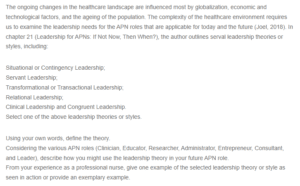Applying Leadership Skills in Exploring the Roles for APRN-Relational Leadership
From a personal perspective, relational leadership is a style of leadership in which the leader uses their relationship-building abilities to create good relationships with others within the organization to make necessary changes and achieve set goals. Although other leadership models provide great frameworks to manage the current changes in healthcare, the relational leadership model is the fittest for managing current and future healthcare systems. My goal as an APN is to become a health system leader. There are various ways in which I can use the relational leadership model as a future nurse leader to effect sustainable staffing and organizational and health system-wide changes to improve patient and health outcomes.
As a relational leader, I can use my empathy skills to build positive relationships and motivate my healthcare team at an individual level to grow interested in the roles and seek to grow the skills for efficiency continuously. Additionally, as the relational leadership model forgoes the hierarchical structures in leadership to adopt a more collaborative, equitable, and inclusive approach to leadership and the ethics of care (Durmuş et al., 2019), I can apply the model to promote trustful and mutually beneficial relationships among nurses, physicians, patients, and other healthcare professionals and individual well-being and organizational and societal flourishing. Such relationships are critical for personal and patient well-being and developing a diverse and inclusive healthcare system.
I have experienced relational leadership in action in various ways. Notably, the current health care focuses on achieving diversity, equity, and inclusion as critical elements of health outcomes (Smallheer et al., 2022). Although not directly quoted,t directly quoted, relationships are being used within our health facility to educate other nurses on the importance of cultural knowledge and sensitivity in developing meaningful relationships between other nurses and patients.
References
Durmuş, S. Ç., Kırca, K., Durmuş, S. Ç., & Kırca, K. (2019). Leadership Styles in Nursing. Nursing – New Perspectives. https://doi.org/10.5772/INTECHOPEN.89679
Smallheer, B., Chidume, T., Spinks, M. K. H., Dawkins, D., & Pestano-Harte, M. (2022). A Scoping Review of the Priority of Diversity, Inclusion, and Equity in Health Care Simulation. Clinical Simulation in Nursing, 71, 41–64. https://doi.org/10.1016/J.ECNS.2022.05.009
ORDER A PLAGIARISM-FREE PAPER HERE
We’ll write everything from scratch
Question
The ongoing changes in the healthcare landscape are influenced most by globalization, economic and technological factors, and the ageing of the population. The complexity of the healthcare environment requires us to examine the leadership needs for the APN roles that are applicable for today and the future (Joel, 2018). In chapter 21 (Leadership for APNs: If Not Now, Then When?), the author outlines serval leadership theories or styles, including:

Applying Leadership Skills in Exploring the Roles for APRN
Situational or Contingency Leadership;
Servant Leadership;
Transformational or Transactional Leadership;
Relational Leadership;
Clinical Leadership and Congruent Leadership.
Select one of the above leadership theories or styles.
Using your own words, define the theory.
Considering the various APN roles (Clinician, Educator, Researcher, Administrator, Entrepreneur, Consultant, and Leader), describe how you might use the leadership theory in your future APN role.
From your experience as a professional nurse, give one example of the selected leadership theory or style as seen in action or provide an exemplary example.

